The Faux Hofner
Many stories have circulated over the
years about
a special
Hofner 500/1 with gold-plated hardware presented to
McCartney.
Most
accounts agree that in 1964 Brian Epstein struck a deal
with Selmer,
the
company that imported Hofner basses in England:
McCartney would endorse
their line of violin basses on little "swing tags" on
each instrument
(see
photo below, from the Bell catalog), and Selmer would
give Epstein a
piece
of the action (£5 a pop) and McCartney a swanky
new bass.
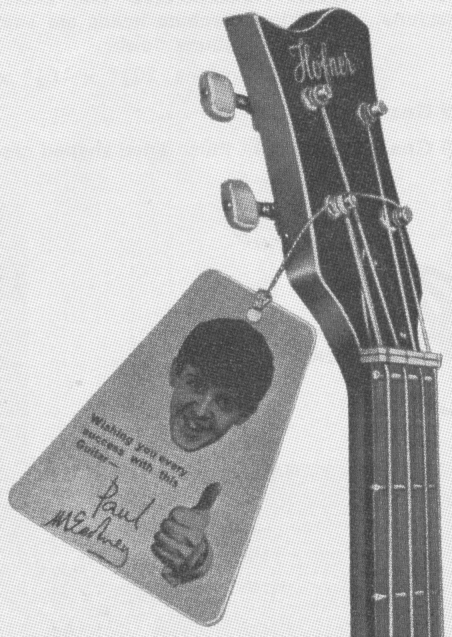 The
most comprehensive scrutiny into this matter has been
done by Andy
Babiuk.
In his excellent book Beatles gear
Babiuk did a
masterful
job of unscrambling what happened after the ink
dried. After
Selmer
made the presentation (the photos of the event have
been lost), it
apparently
kept the special 500/1 to exhibit in an upcoming trade
show, then
either
returned it to stock, which seems unlikely, or sent it
to McCartney at
NEMS or Abbey Road, where it was promptly
stolen. The
most comprehensive scrutiny into this matter has been
done by Andy
Babiuk.
In his excellent book Beatles gear
Babiuk did a
masterful
job of unscrambling what happened after the ink
dried. After
Selmer
made the presentation (the photos of the event have
been lost), it
apparently
kept the special 500/1 to exhibit in an upcoming trade
show, then
either
returned it to stock, which seems unlikely, or sent it
to McCartney at
NEMS or Abbey Road, where it was promptly
stolen.
It surfaced the next year in a music
shop in
Luton, where
a young bassist by the name of John Bunning bought it
for
£65.
Apparently Bunning knew of the McCartney connection,
because he bragged
about it to a local newspaper, yet in '71 he traded it
to a friend, as
Babiuk reports. The friend sold it to Jim
Marshall, who ran a
music
store in Bletchley. Marshall sold it to a fellow
named Stephen
Boyce,
who played it for 10 years. After Mr. Boyce
passed away, his
widow
sold it to a music store in Biggleswade for
£200. That
outfit
called around looking for a replacement pickguard, and
when they
contacted
Music Ground in Doncaster, an intrigued Justin
Harrison bought the bass
for £800. Harrison figured out what he
had, calculated its
value at £4,500 and offered it for auction at
Sotheby's in 1994,
but without proper documentation the bass didn't
sell.
In '97 Music Ground tried again to
auction the
bass, this
time in Tokyo through Bonhams, but their claim that
McCartney had
played
the bass as a Beatle was shot down by various parties,
including a
British
consumer-rights TV show -- and McCartney
himself. Eventually the
bass went at auction but for some reason the sale was
never finalized,
so Music Ground still has this instrument.
What can be said about this bass?
Well,
Paul McCartney
touched it.
|
Note: In
2000,
someone got
hold of the paperwork on this guitar and brought
it,
along with a late
'90s
reissue
model, to the Rock and Roll Hall of Fame, where an
inept curator
declared
it genuine and hung it on the wall.
When its
true vintage
was
pointed out, this "fake faux" was taken down more or
less
promptly.
Don't be afraid to ask questions, kids.
|
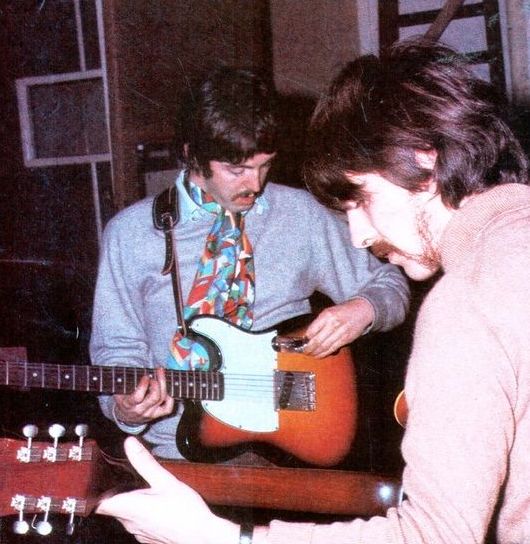 1966: 1964
Fender Esquire sunburst (vintage unknown):
McCartney bought this
single-pickup
Telecaster model during the Revolver
sessions and had
the
strap button moved to the "horn" side of the body.
Also used on
"Good
Morning, Good Morning" and "Helter Skelter."
As far as I
know,
McCartney still has this guitar.
1966: 1964
Fender Esquire sunburst (vintage unknown):
McCartney bought this
single-pickup
Telecaster model during the Revolver
sessions and had
the
strap button moved to the "horn" side of the body.
Also used on
"Good
Morning, Good Morning" and "Helter Skelter."
As far as I
know,
McCartney still has this guitar.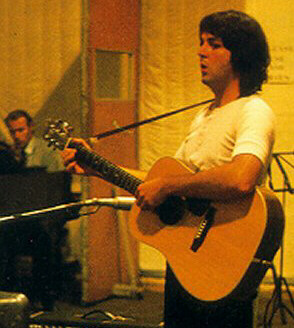
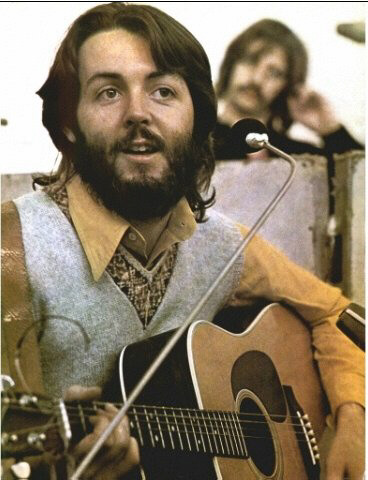
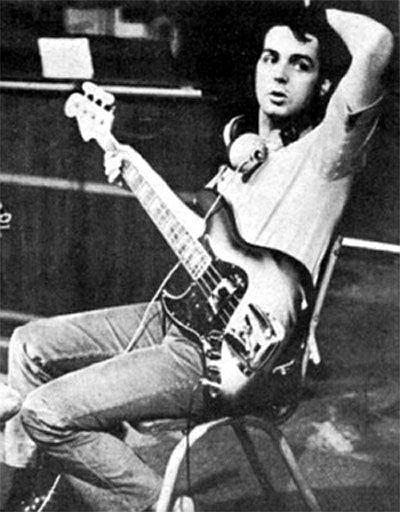 1968: 1966
Fender Jazz Bass: Apparently not part of
Fender's "gift
package"
of guitars and amps (they'd included a right-handed
Jazz Bass),
this sunburst model shows up in Abbey Road studio photos
from "White
Album"
sessions. Its oval-shaped tuners are peculiar to
the 1966 model
year;
Fender basses otherwise featured "clover leaf"
tuners. According
to Walter Everett in The Beatles as Musicians
(Volume 1),
this
Jazz
Bass is played on five tracks: "Yer Blues," "Glass
Onion," "While
My Guitar Gently Weeps," "Sun King" and "Mean Mr.
Mustard."
[Everett infers that the right-handed model was also
used during the
sessions,
by Lennon ("Helter Skelter") and Harrison ("Back in the
USSR.")]
McCartney's kept most of his instruments, and this
probably is no
exception.
1968: 1966
Fender Jazz Bass: Apparently not part of
Fender's "gift
package"
of guitars and amps (they'd included a right-handed
Jazz Bass),
this sunburst model shows up in Abbey Road studio photos
from "White
Album"
sessions. Its oval-shaped tuners are peculiar to
the 1966 model
year;
Fender basses otherwise featured "clover leaf"
tuners. According
to Walter Everett in The Beatles as Musicians
(Volume 1),
this
Jazz
Bass is played on five tracks: "Yer Blues," "Glass
Onion," "While
My Guitar Gently Weeps," "Sun King" and "Mean Mr.
Mustard."
[Everett infers that the right-handed model was also
used during the
sessions,
by Lennon ("Helter Skelter") and Harrison ("Back in the
USSR.")]
McCartney's kept most of his instruments, and this
probably is no
exception. The
most comprehensive scrutiny into this matter has been
done by Andy
Babiuk.
In his excellent book Beatles gear
Babiuk did a
masterful
job of unscrambling what happened after the ink
dried. After
Selmer
made the presentation (the photos of the event have
been lost), it
apparently
kept the special 500/1 to exhibit in an upcoming trade
show, then
either
returned it to stock, which seems unlikely, or sent it
to McCartney at
NEMS or Abbey Road, where it was promptly
stolen.
The
most comprehensive scrutiny into this matter has been
done by Andy
Babiuk.
In his excellent book Beatles gear
Babiuk did a
masterful
job of unscrambling what happened after the ink
dried. After
Selmer
made the presentation (the photos of the event have
been lost), it
apparently
kept the special 500/1 to exhibit in an upcoming trade
show, then
either
returned it to stock, which seems unlikely, or sent it
to McCartney at
NEMS or Abbey Road, where it was promptly
stolen.